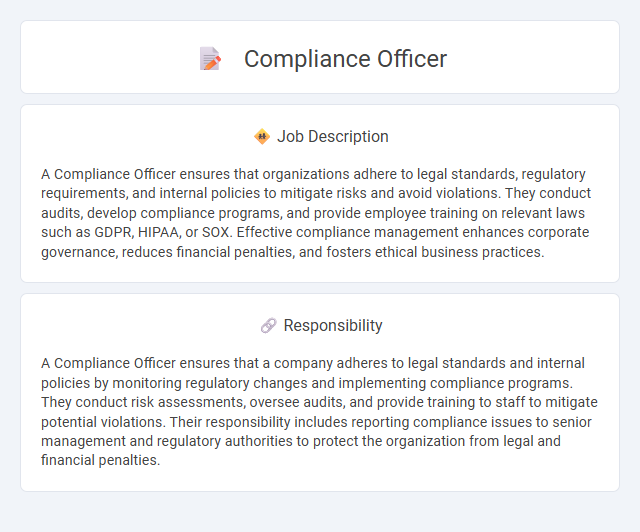
A Compliance Officer ensures that organizations adhere to legal standards, regulatory requirements, and internal policies to mitigate risks and avoid violations. They conduct audits, develop compliance programs, and provide employee training on relevant laws such as GDPR, HIPAA, or SOX. Effective compliance management enhances corporate governance, reduces financial penalties, and fosters ethical business practices.
Individuals with strong attention to detail, analytical skills, and a high sense of integrity are likely to be well-suited for a Compliance Officer role. Those who can remain objective under pressure and have a willingness to stay updated on regulatory changes may find this job fitting. Conversely, individuals who prefer less structured environments or struggle with enforcing rules might face challenges in this position.
Qualification
A Compliance Officer typically requires a bachelor's degree in law, finance, business administration, or a related field, often complemented by certifications such as Certified Compliance & Ethics Professional (CCEP) or Certified Regulatory Compliance Manager (CRCM). Strong knowledge of regulatory frameworks, risk management, and internal controls is essential, along with skills in auditing and reporting. Experience in legal research, policy development, and stakeholder communication enhances a Compliance Officer's effectiveness in ensuring organizational adherence to laws and regulations.
Responsibility
A Compliance Officer ensures that a company adheres to legal standards and internal policies by monitoring regulatory changes and implementing compliance programs. They conduct risk assessments, oversee audits, and provide training to staff to mitigate potential violations. Their responsibility includes reporting compliance issues to senior management and regulatory authorities to protect the organization from legal and financial penalties.
Benefit
A Compliance Officer likely enhances organizational integrity by ensuring adherence to laws and regulations, reducing the risk of legal penalties. This role probably improves operational efficiency through the establishment of clear policies and procedures. Companies might also experience increased stakeholder trust and a stronger reputation in the market due to effective compliance management.
Challenge
Compliance officer roles likely involve navigating complex regulatory frameworks, requiring constant adaptation to evolving laws and industry standards. The challenge may stem from the need to balance strict adherence to regulations with practical business operations. Ensuring organizational compliance while anticipating potential risks could demand sharp analytical skills and proactive problem-solving.
Career Advancement
Compliance officers play a crucial role in ensuring organizations adhere to legal and regulatory standards, making expertise in risk management and industry-specific regulations essential for career advancement. Mastery of regulatory frameworks such as GDPR, SOX, and AML increases opportunities for promotions to senior compliance manager or chief compliance officer roles. Advanced certifications, including Certified Compliance & Ethics Professional (CCEP) and Certified Regulatory Compliance Manager (CRCM), significantly enhance career growth prospects and salary potential.
 kuljobs.com
kuljobs.com